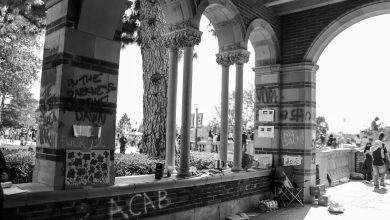Defending Joan of Arc’s Legacy with “La Passion de Jeanne d’Arc”

Design by Bridget Callahan
This past Thursday at Royce Hall, the UCLA Center for Medieval and Renaissance Studies held a screening of the silent film “The Passion of Joan of Arc,” with live piano accompaniment by silent film pianist Cliff Retallick. The event was free and open to the public, with students, staff, and faculty mingling in the audience while munching on the popcorn provided by the door. Movie events like this one are held quarterly by the Center for Medieval and Renaissance Studies, but according to the Center’s director, Massimo Ciavolella, this particular film choice is especially relevant.
The film itself faced as many trials and tribulations as the heroine it portrayed. La Passion de Jeanne d’Arc was censored upon its release due to its intense and sometimes violent content. Subsequently, its prints were damaged by several fires. In the 1980s, the film was finally revived into the movie audiences see today. The film is based on the historical records of Joan of Arc’s trial for heresy by the English forces who captured her. As the story unfolded, the audience was captivated both by the film’s poignancy and the beautiful piano accompaniment.
The pianist, Cliff Retallick, played continuously throughout the film. Retallick explained that “this movie is a powerful, unforgettable piece, and I use my music to drive the mood and serve the film.” All of the music Retallick played was improvised, an impressive feat in and of itself. According to Ciavolella, the event was truly a collaboration between the film and the pianist, whose music did indeed mesh beautifully with the movie. With no other sounds in the room, the emotions of the audience were drawn out by the scenes played on screen and the soulful tunes of the piano that resonated deeply with the material.
Jeanne d’Arc, better known as Joan of Arc, has often been used as a French national icon of patriotism. However, in recent years, the leader of the far-right French National Front party and French presidential candidate Marine Le Pen has been compared to Joan of Arc. Le Pen even spoke at a May Day festival honoring Joan’s legacy, standing in front of Joan’s statue and using Joan’s iconography to promote an emphasis on the French military and a policy of French isolationism and to rid France of foreigners. The movie shown by the UCLA Center for Medieval and Renaissance Center aimed to push back against the manipulation of Joan of Arc’s legacy for xenophobic purposes, and to show audiences who Joan truly was.
La Passion de Jeanne d’Arc is exactly that; it tells the story of Joan not just as the brave warrior she is known as today, but also as a passionate person. Through the film, audiences discover Joan as a young woman and a human being. The entire film is wrought with emotion; Joan is portrayed as solemn and serious, but she is also scared for her life. She is depicted standing up for herself, her religion, and her country, but she is also seen crying, showing that her feelings are just as valid and human as that of any other person.
Ciovella said “it is a shame that [the film] is manipulated in a negative manner when although it is patriotic, it is meant to be positive. Joan’s image has been appropriated by TV, cinema, and political systems for racist overtones, and that is not the purpose of this movie.” Although Joan is famous for fighting in the Hundred Years’ War to drive the English out of France, her circumstances were far different from the situation today. Xenophobic members of the French far-right party claim that Joan’s legacy was to push all foreigners out of France, which is much more diverse than centuries prior.
Joan’s purpose was not to drive out foreigners, but rather to defend the oppressed. The English at the time, as seen in the movie, were extremely powerful and used their power and privilege to take over territories in France. In the film, Joan clearly states that she does not believe that God has sided with either the English or the French, but that she has merely been told by God to protect her people from war. The English, too, are not wholly villainized in the movie; Joan gains sympathy and inspires kinship in the English people who witness her trial and death, and these common people rally against the cabal of powerful Englishmen who kill Joan.
All in all, the movie screening was a fun event with an inspirational message of hope and tolerance. Fittingly, Ciavolella’s parting words after the rounds of applause summed up the event in its totality: “This film shows that the Middle Ages and the Renaissance still have reason and value today, and Joan’s legacy shows that we should love people regardless of nationality or race.”




